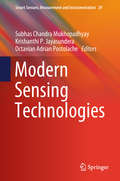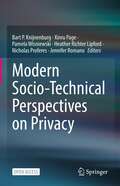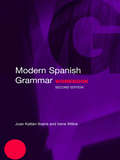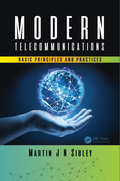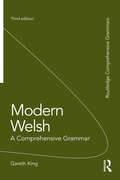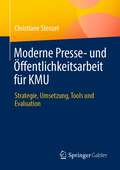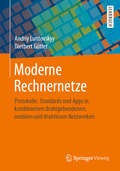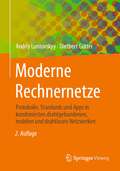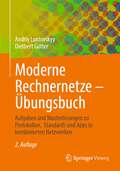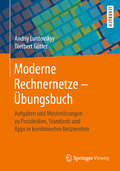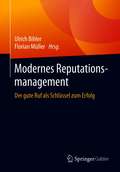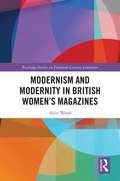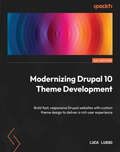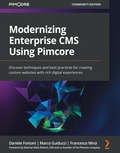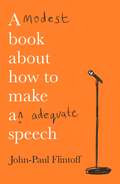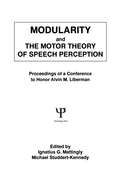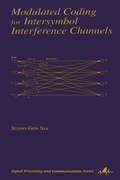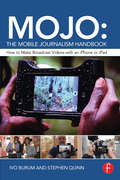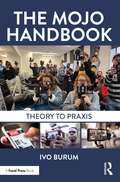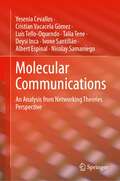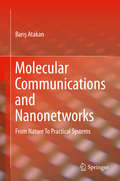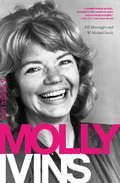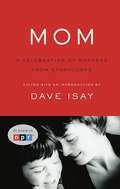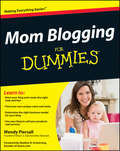- Table View
- List View
Modern Sensing Technologies (Smart Sensors, Measurement and Instrumentation #29)
by Octavian Adrian Postolache Krishanthi P. Jayasundera Subhas Chandra MukhopadhyayThis book provides an overview of modern sensing technologies and reflects the remarkable advances that have been made in the field of intelligent and smart sensors, environmental monitoring, health monitoring, and many other sensing and monitoring contexts in today’s world. It addresses a broad range of aspects, from human health monitoring to the monitoring of environmental conditions, from wireless sensor networks and the Internet of Things to structural health monitoring. Given its breadth of scope, the book will benefit researchers, practitioners, technologists and graduate students involved in the monitoring of systems within the human body, functions and activities, healthcare technologies and services, the environment, etc.
Modern Socio-Technical Perspectives on Privacy
by Nicholas Proferes Bart P. Knijnenburg Xinru Page Pamela Wisniewski Heather Richter Lipford Jennifer RomanoThis open access book provides researchers and professionals with a foundational understanding of online privacy as well as insight into the socio-technical privacy issues that are most pertinent to modern information systems, covering several modern topics (e.g., privacy in social media, IoT) and underexplored areas (e.g., privacy accessibility, privacy for vulnerable populations, cross-cultural privacy). The book is structured in four parts, which follow after an introduction to privacy on both a technical and social level: Privacy Theory and Methods covers a range of theoretical lenses through which one can view the concept of privacy. The chapters in this part relate to modern privacy phenomena, thus emphasizing its relevance to our digital, networked lives. Next, Domains covers a number of areas in which privacy concerns and implications are particularly salient, including among others social media, healthcare, smart cities, wearable IT, and trackers. The Audiences section then highlights audiences that have traditionally been ignored when creating privacy-preserving experiences: people from other (non-Western) cultures, people with accessibility needs, adolescents, and people who are underrepresented in terms of their race, class, gender or sexual identity, religion or some combination. Finally, the chapters in Moving Forward outline approaches to privacy that move beyond one-size-fits-all solutions, explore ethical considerations, and describe the regulatory landscape that governs privacy through laws and policies. Perhaps even more so than the other chapters in this book, these chapters are forward-looking by using current personalized, ethical and legal approaches as a starting point for re-conceptualizations of privacy to serve the modern technological landscape. The book’s primary goal is to inform IT students, researchers, and professionals about both the fundamentals of online privacy and the issues that are most pertinent to modern information systems. Lecturers or teachers can assign (parts of) the book for a “professional issues” course. IT professionals may select chapters covering domains and audiences relevant to their field of work, as well as the Moving Forward chapters that cover ethical and legal aspects. Academics who are interested in studying privacy or privacy-related topics will find a broad introduction in both technical and social aspects.
Modern Spanish Grammar Workbook (Modern Grammar Workbooks)
by Juan Kattan-Ibarra Irene WilkieModern Spanish Grammar Workbook is an innovative book of exercises and language tasks for all learners of European or Latin American Spanish.The book is divided into two sections:* Section 1 provides exercises based on essential grammatical structures* Section 2 practises everyday functions such as making introductions and expressing needsA comprehensive answer key at the back of the book enables you to check on your progress.Modern Spanish Grammar Workbook is ideal for all learners of European or Latin American Spanish including undergraduates taking Spanish as a major or minor part of their studies, as well as intermediate and advanced students in schools and adult education. It can be used independently or alongside Modern Spanish Grammar, also published by Routledge.
Modern Telecommunications: Basic Principles and Practices
by Martin J SibleyThis is an introductory text that will equip readers with the necessary tools to study telecommunications further. It explains the fundamentals and background behind digital TV, radio, cell phones, and satellites as well as the legacy analogue transmissions. It covers digital modulation and analogue communications as this is something many people still use (VHF FM for example). The book also clearly explains the mathematics and simplifies the process to make it more approachable to students.
Modern Welsh: A Comprehensive Grammar (Routledge Comprehensive Grammars)
by Gareth KingModern Welsh: A Comprehensive Grammar is the ideal reference source for all speakers and learners of Welsh. Focusing on contemporary spoken Welsh, it presents the complexities of the language in a concise and readable form. Common grammatical patterns and parts of speech are discussed in detail and without jargon and extensive cross references make the book comprehensive and easy to use. Now in its third edition, the Grammar has been thoroughly revised and updated throughout. Changes include an increased number of illustrative examples, additional appendices for easy reference, inclusion of IPA phonetic symbols, and expanded sections on further reading. Features include: Full use of authentic examples Particular attention to areas of confusion and difficulty Extensive index and cross referencing Initial consonant mutations marked throughout Separate sections on communicative functions Notes on variation between dialects and on formal written language Modern Welsh: A Comprehensive Grammar is the most thorough, detailed and user-friendly Welsh grammar available in English today. It is suitable for use in schools, colleges, universities and adult classes at all levels and will, as its predecessors, prove an invaluable aid for Welsh language learning and teaching.
Moderne Presse- und Öffentlichkeitsarbeit für KMU: Strategie, Umsetzung, Tools und Evaluation
by Christiane StenzelDieses Buch liefert kleinen und mittelständischen Unternehmen alle wesentlichen Grundlagen für eine zeitgemäße Pressearbeit – von der Strategieentwicklung bis zur Echtzeit-Medienevaluation, von klassischen PR-Maßnahmen bis hin zu SEO-PR. Denn gerade in wirtschaftlich herausfordernden Zeiten rückt die Rolle der Kommunikation für KMU immer stärker in den Mittelpunkt. Zudem vollzieht sich in den Medienhäusern ein Wandel, der die Arbeit von Kommunikator*innen stark beeinflusst und das Aufgabenspektrum deutlich erweitert. Die Autorin erläutert, wie bedeutend gute Pressefotos, Bewegtbild und multimedialer Content sind, was Framing bedeutet und warum Storytelling immer wichtiger wird. Darüber hinaus werden die wichtigsten Stakeholder*innen, Kanäle sowie effiziente Tools vorgestellt und durch Stimmen aus der Praxis ergänzt. Ein pragmatischer Leitfaden mit allen erfolgsentscheidenden und vor allem realisierbaren Maßnahmen für Mitarbeiter*innen kleiner und mittelständischer Pressestellen, Start-ups, Gründer*innen, Vereine, Verbände und NGOs.
Moderne Rechnernetze: Protokolle, Standards und Apps in kombinierten drahtgebundenen, mobilen und drahtlosen Netzwerken
by Andriy Luntovskyy Dietbert GütterDas Buch mit einem stark ausgeprägten modularen Aufbau, wird als ein vorlesungsbegleitendes Lehrbuch zum Modul Computernetzwerke im ET- und IT-Fachstudium an technischen Hochschulen empfohlen und enthält drei Teile sowie Zwischenfragen mit dazugehörigen Lösungen und weitere Übungsaufgaben. Teil I beinhaltet eine Einführung in das Gebiet der Rechnernetze. Die weiterführenden Teile II und III behandeln aktuelle Rechnernetztechnologien, Kopplungselemente und Verkabelungskonzepte. Die Leser werden dabei mit verteilten Softwaresystemen und Rechnernetzanwendungen vertraut gemacht.
Moderne Rechnernetze: Protokolle, Standards und Apps in kombinierten drahtgebundenen, mobilen und drahtlosen Netzwerken
by Andriy Luntovskyy Dietbert GütterDas Buch mit einem stark ausgeprägten modularen Aufbau, wird als ein vorlesungsbegleitendes Lehrbuch zum Modul Computernetzwerke im ET- und IT-Fachstudium an technischen Hochschulen empfohlen und enthält drei Teile sowie Zwischenfragen mit dazugehörigen Lösungen und weitere Übungsaufgaben. Teil I beinhaltet eine Einführung in das Gebiet der Rechnernetze. Die weiterführenden Teile II und III behandeln aktuelle Rechnernetztechnologien, Kopplungselemente und Verkabelungskonzepte. Die Leser werden dabei mit verteilten Softwaresystemen und Rechnernetzanwendungen vertraut gemacht.
Moderne Rechnernetze – Übungsbuch: Aufgaben und Musterlösungen zu Protokollen, Standards und Apps in kombinierten Netzwerken
by Andriy Luntovskyy Dietbert GütterDieses Übungsbuch ergänzt das Lehrbuch "Luntovskyy/Gütter, Moderne Rechnernetze: Protokolle, Standards und Apps in kombinierten drahtgebundenen, mobilen und drahtlosen Netzwerken" um praktische Übungen und dazugehörige Musterlösungen.Die Übungen und Musterlösungen werden den Teilen I, II, III im Lehrbuch zugeordnet und folgen damit dem modularen Aufbau des o.g. Lehrbuchs.Lehrbuch und Übungsbuch eignen sich als vorlesungsbegleitende Literatur zum Modul Computernetzwerke im ET- und IT-Fachstudium für Studierende und Dozenten an technischen Hochschulen.
Moderne Rechnernetze - Übungsbuch: Aufgaben und Musterlösungen zu Protokollen, Standards und Apps in kombinierten Netzwerken
by Andriy Luntovskyy Dietbert GütterDieses Übungsbuch ergänzt das Lehrbuch "Luntovskyy/Gütter, Moderne Rechnernetze: Protokolle, Standards und Apps in kombinierten drahtgebundenen, mobilen und drahtlosen Netzwerken" um praktische Übungen und dazugehörige Musterlösungen.Die Übungen und Musterlösungen werden den Teilen I, II, III im Lehrbuch zugeordnet und folgen damit dem modularen Aufbau des o.g. Lehrbuchs.Lehrbuch und Übungsbuch eignen sich als vorlesungsbegleitende Literatur zum Modul Computernetzwerke im ET- und IT-Fachstudium für Studierende und Dozenten an technischen Hochschulen.
Modernes Reputationsmanagement: Der gute Ruf als Schlüssel zum Erfolg
by Ulrich Bihler Florian MüllerDieses Buch erklärt, wie modernes Reputationsmanagement von Unternehmen und Organisationen erfolgreich und nachhaltig gestaltet werden kann – insbesondere in volatilen Zeiten des digitalen und gesellschaftlichen Wandels. Emotionale Aspekte und vor allem die Frage, wofür ein Unternehmen steht und eintritt, spielen eine immer wichtigere Rolle – zum Beispiel bei der Kaufentscheidung des Kunden. Die Reputation eines Unternehmens als immaterieller Vermögenswert bestimmt damit maßgeblich den Erfolg und muss bei allen unternehmerischen Herausforderungen professionell, integriert und zielorientiert gemanagt werden. Die Beitragsautoren erläutern grundlegende Funktionsweisen von Unternehmensreputation sowie die Wirkmechanismen von Issues und Public Affairs Management für einen guten Ruf. Sie zeigen auf, wie beispielsweise Predictive Analytics, Purpose, Thought-Leadership-Strategien oder multisensuale Stakeholderkommunikation einen dringend notwendigen Perspektivwechsel herbeiführen und wie Interne Kommunikation sowie CEO-Kommunikation einen ganzheitlichen Reputationsansatz unterstützen können.Ein Buch voller überraschender Perspektiven, neuer Zusammenhänge, interessanter Insights und hilfreicher Praxistipps.
Modernism and Modernity in British Women’s Magazines (Routledge Studies in Twentieth-Century Literature)
by Alice WoodThis book explores responses to the strangeness and pleasures of modernism and modernity in four commercial British women’s magazines of the interwar period. Through extensive study of interwar Vogue (UK), Eve, Good Housekeeping (UK), and Harper’s Bazaar (UK), Wood uncovers how modernism was received and disseminated by these fashion and domestic periodicals and recovers experimental journalism and fiction within them by an array of canonical and marginalized writers, including Storm Jameson, Rose Macaulay, Gertrude Stein, and Virginia Woolf. The book’s analysis is attentive to text and image and to interactions between editorial, feature, and advertising material. Its detailed survey of these largely neglected magazines reveals how they situated radical aesthetics in relation to modernity’s broader new challenges, diversions, and opportunities for women, and how they approached high modernist art and literature through discourses of fashion and celebrity. Modernism and Modernity in British Women’s Magazines extends recent research into modernism’s circulation through diverse markets and publication outlets and adds to the substantial body of scholarship concerned with the relationship between modernism and popular culture. It demonstrates that commercial women’s magazines subversively disrupted and sustained contemporary hierarchies of high and low culture as well as actively participating in the construction of modernism’s public profile.
Modernizing Drupal 10 Theme Development: Build fast, responsive Drupal websites with custom theme design to deliver a rich user experience
by Luca LussoA comprehensive guide to creating Drupal themes from scratch, from design to fully styled websites with custom Twig templates and headless architectureKey FeaturesExplore real-world examples with proven methodologies to gain a deeper insight into the Drupal theme layerLearn how to translate a graphic design into a maintainable and robust Drupal themeImprove performance and accessibility with a decoupled frontend to consume data exposed by Drupal’s APIsPurchase of the print or Kindle book includes a free PDF eBookBook DescriptionWorking with themes in Drupal can be challenging, given the number of layers and APIs involved. Modernizing Drupal 10 Theme Development helps you explore the new Drupal 10’s theme layer in depth. With a fully implemented Drupal website on the one hand and a set of Storybook components on the other, you’ll begin by learning to create a theme from scratch to match the desired final layout. Once you’ve set up a local environment, you’ll get familiarized with design systems and learn how to map them to the structures of a Drupal website. Next, you’ll bootstrap your new theme and optimize Drupal’s productivity using tools such as webpack, Tailwind CSS, and Browsersync. As you advance, you’ll delve into all the theme layers in a step-by-step way, starting from how Drupal builds an HTML page to where the template files are and how to add custom CSS and JavaScript. You’ll also discover how to leverage all the Drupal APIs to implement robust and maintainable themes without reinventing the wheel, but by following best practices and methodologies. Toward the end, you’ll find out how to build a fully decoupled website using json:api and Next.js. By the end of this book, you’ll be able to confidently build custom Drupal themes to deliver state-of-the-art websites and keep ahead of the competition in the modern frontend world.What you will learnMap design systems made by Storybook components to Drupal structuresUnderstand and use render arrays and Twig templatesGet familiarized with the new Single Directory Component feature introduced in Drupal 10.1Define, import, and use CSS and JavaScript librariesDiscover how to style content created with fields and paragraphsDefine, place, customize, and style blocksExplore advanced topics like extending Twig, making a theme configurable, and boosting performance and accessibilityFind out how to build a decoupled website using json:api and Next.jsWho this book is forIf you are a Drupal backend developer or frontend developer who wants to create Drupal themes that follow industry best practices and are fast and maintainable, this book is for you. Basic knowledge of HTML, CSS, and JavaScript and working knowledge of a CMS are needed to grasp the concepts present in this book.
Modernizing Enterprise CMS Using Pimcore: Discover techniques and best practices for creating custom websites with rich digital experiences
by Daniele Fontani Marco Guiducci Francesco Mina Dietmar Dietz RietschA practical guide to developing, administering, and scaling content management solutions in your organization for supporting digital transformation using PimcoreKey FeaturesKick-start your CMS career by preparing for Pimcore developer certificationsCreate custom websites with a rich digital experience for your business users with the help of step-by-step examplesGet to grips with Pimcore's enterprise features for product management and data managementBook DescriptionUsed by over eighty thousand companies worldwide, Pimcore is the leading open source enterprise-level content management system (CMS) solution. It is an impressive alternative to conventional CMSes and is ideal for creating e-commerce and complex enterprise websites. This book helps developers working with standard CMSes such as WordPress and Drupal to use their knowledge of CMSes to learn Pimcore CMS in a practical way. You'll start by learning what Pimcore is and explore its various services such as PIM, MDM, and DAM. The book then shows you various techniques for developing custom websites in Pimcore based on the scale of your organization. You'll learn how to use Pimcore to improve the digital transformation of a company by implementing enterprise Pimcore features. As you advance, you'll discover Pimcore's capabilities and features that make it a faster and more secure alternative to traditional CMSes. As well as demonstrating practical use cases, Modernizing Enterprise CMS Using Pimcore can help you understand the benefits of using Pimcore as a CMS solution, sharing best practices and proven techniques for designing professional Pimcore sites. By the end of this book, you'll be a trained Pimcore developer, able to create complex websites, and be well-versed in Pimcore's enterprise features such as MDM, PIM, and DAM.What you will learnCreate, edit, and manage Pimcore documents for your web pagesManage web assets in Pimcore using the digital asset management (DAM) featureDiscover how to create layouts, templates, and custom widgets for your web pagesAdminister third-party add-ons for your Pimcore site using the admin UIDiscover practices to use Pimcore as a product information management (PIM) systemExplore Pimcore's master data management (MDM) for enterprise CMS developmentBuild reusable website components and save time using effective tips and tricksWho this book is forThis book is for web developers and CMS professionals looking for an alternative to WordPress and traditional CMS. Enterprise application developers looking for enterprise solutions for digital transformation will find this book useful. Beginner-level knowledge of PHP, HTML, and CSS is needed to understand the code examples used in the book.
A Modest Book About How to Make an Adequate Speech
by John-Paul Flintoff<p>"Where I come from, where modesty is a sin, Flintoff 's book would be called 'The Indispensable Guide to Giving an Unforgettable Speech'." Jay Heinrichs, New York Times bestselling author<p> <p>Most of us dread public speaking. But at some point we find ourselves forced to make a speech. And we worry: Will my jokes fall flat? What if I freeze? Is it okay to read notes? What if people walk out?<p> <p>This book won't magically transform you into a fast-talking corporate hotshot. But it will show you how to think about public speaking in a new way, and with a spot of luck, you will achieve adequacy. Or better!<p> <p>Drawing on ancient principles of rhetoric and his own entertaining successes and failures on the speech-giving circuit, John-Paul Flintoff provides simple but effective techniques to help you to speak with confidence to any crowd, whether it's a work presentation or a best friend's wedding.<p> <p>Humble but motivating, this is a guide to finding your voice, even if it's a bit croaky at first, and a reassuring affirmation that we all have something to say.<p>
Modularity and the Motor theory of Speech Perception: Proceedings of A Conference To Honor Alvin M. Liberman
by Ignatius G. Mattingly Michael Studdert-KennedyA compilation of the proceedings of a conference held to honor Alvin M. Liberman for his outstanding contributions to research in speech perception, this volume deals with two closely related and controversial proposals for which Liberman and his colleagues at Haskins Laboratories have argued forcefully over the past 35 years. The first is that articulatory gestures are the units not only of speech production but also of speech perception; the second is that speech production and perception are not cognitive processes, but rather functions of a special mechanism. This book explores the implications of these proposals not only for speech production and speech perception, but for the neurophysiology of language, language acquisition, higher-level linguistic processing, the visual perception of phonetic gestures, the production and perception of sign language, the reading process, and learning to read. The contributors to this volume include linguists, psycholinguists, speech scientists, neurophysiologists, and ethologists. Liberman himself responds in the final chapter.
Modulated Coding for Intersymbol Interference Channels (Signal Processing and Communications)
by Xiang-Gen XiaA study of modulated coding (MC), a technique for intersymbol interference (ISI) mitigation. It discusses MC when the ISI is known at both transmitter and receiver, and when only the receiver knows the ISI. It showcases polynomial antiquity resistant modulated coding, and provides an examination of transmitter-assisted ISI equalization.
MOJO: How to Make Broadcast Videos with an iPhone or iPad
by Stephen Quinn Ivo BurumMOJO: The Mobile Journalism Handbook is the first book devoted specifically to training citizens, journalism students and media professionals to produce professional-quality videos with only a mobile device. As journalism becomes increasingly competitive, students and emerging professionals need a broader skillset to make themselves more employable, whether as mainstream or entrepreneurial journalists. This book by Dr. Ivo Burum and Dr. Stephen Quinn, world experts in mobile journalism, provides comprehensive coverage of all the skills and practices needed to be a mobile journalist. Key features: Burum and Quinn underline the importance of story and storytelling, the crucial context journalists always need to keep in mind. Other books and tutorials merely offer step-by-step guidance to mobile technology and apps. The book synthesizes the knowledge and more than 70 years of combined expertise of two of the world’s leading mobile journalism practitioners, offering sage advice and tips from people who have trained mojos in more than 20 countries. Companion Website: How-to videos on the companion website offer powerful ways for learners to absorb the content easily, walking them through the key mojo components of research, shooting, scripting, voice-over, editing and post-production. www.routledge.com/cw/burum Ivo Burum is an award-winning writer, director and television executive producer. He has more than 30 years’ experience working across genres including frontline international current affairs. A pioneer in UGS creation, Dr. Burum lectures in multimedia journalism. This is his second book about mojo. He runs Burum Media, a mojo and web TV consultancy that provides training for journalists, educators and remote communities internationally. Stephen Quinn was a journalist for 20 years before he became a university professor in 1996. Dr. Quinn taught journalism in five countries until he returned to journalism in 2011 in Hong Kong. His UK-based company MOJO Media Insights trains mobile journalists around the world. This is his twenty-first print book. He has also produced 5 iBooks. He co-writes a weekly column syndicated to seven countries.
The Mojo Handbook: Theory to Praxis
by Ivo BurumThe Mojo Handbook: Theory to Praxis offers a detailed and engaging crash course on how to use mobile tools to create powerful journalistic stories. Drawing on both theoretical underpinnings and practical techniques, the book outlines the fundamentals of mobile journalism methods, by placing mobile storytelling within a wider context of current affairs, documentary filmmaking and public relations. The book offers expert advice for how to use storytelling skills to transform mobile content into engaging and purposeful user-generated stories for audiences. Topics covered include tips for recording dynamic video and clean audio, conducting interviews on your phone and editing and post-production processes, as well as advice on how to handle copyright issues and a primer on journalistic ethics. The book also includes a comprehensive glossary of terms to help students navigate the video production and mobile journalism world. The Mojo Handbook is a valuable resource for aspiring multimedia professionals in journalism, strategic and corporate communication, community and education, as well as anyone looking to incorporate mobile into their visual storytelling tool kit.
Molecular Communication
by Tadashi Nakano Andrew W. Eckford Tokuko HaraguchiThis comprehensive guide, by pioneers in the field, brings together, for the first time, everything a new researcher, graduate student or industry practitioner needs to get started in molecular communication. Written with accessibility in mind, it requires little background knowledge, and provides a detailed introduction to the relevant aspects of biology and information theory, as well as coverage of practical systems. The authors start by describing biological nanomachines, the basics of biological molecular communication and the microorganisms that use it. They then proceed to engineered molecular communication and the molecular communication paradigm, with mathematical models of various types of molecular communication and a description of the information and communication theory of molecular communication. Finally, the practical aspects of designing molecular communication systems are presented, including a review of the key applications. Ideal for engineers and biologists looking to get up to speed on the current practice in this growing field.
Molecular Communications: An Analysis from Networking Theories Perspective
by Yesenia Cevallos Cristian Vacacela Gómez Luis Tello-Oquendo Talia Tene Deysi Inca Ivone Santillán Albert Espinal Nicolay SamaniegoThis book provides a complete analysis of molecular communications systems from the paradigm of TCP/IP network stack, and it exploits network theories (e.g. independent functions of a layer into a stack, addressing, flow control, error control, and traffic control) and applies them to biological systems. The authors show how these models can be applied in different areas such as industry, medicine, engineering, biochemistry, biotechnology, computer sciences, and other disciplines. The authors then explain how it is possible to obtain enormous benefits from these practices when applied in medicine, such as enhancing current treatment of diseases and reducing the side effects of drugs and improving the quality of treatment for patients. The authors show how molecular communications systems, in contrast to existing telecommunication paradigms, use molecules as information carriers. They show how sender biological nanomachines (bio-nano machines) encode data on molecules (signal molecules) and release the molecules into the environment. They go on to explain how the molecules then travel through the environment to reach the receiver bio-nano machines, where they biochemically react with the molecules to decipher information. This book is relevant to those studying telecommunications and biomedical students, engineers, masters, PhDs, and researchers.
Molecular Communications and Nanonetworks
by Barış AtakanThis book will introduce the concept of molecular communications and nanonetworks. The publication addresses why nanoscale communication is needed for the sophisticated nano and biotechnology applications. The text introduces the frontier applications of the molecular communication and nanonetworks. The book examines the molecular communication types called active, passive, and gap junction molecular communications. The author presents the molecular transmitter, receiver, encoding and decoding mechanisms used in these systems. Discussing the molecular communication system model and looking at the unique characteristics of practical molecular communication systems and these chemical reactions and their effects on the communication performance. Finally, the book examines the point-to-point, broadcast, and multiple-access molecular channel and shows two promising application examples of the nanonetworks. The first application example is the body area nanonetworks used in nanomedicine. the second nanonetwork application example, i. e. , NanoSensor Networks (NSNs) with Molecular Communication.
Molly Ivins: A Rebel Life
by Bill Minutaglio W. Michael SmithShe was a groomed for a gilded life in moneyed Houston, but Molly Ivins left the country club behind to become one of the most provocative, courageous, and influential journalists in American history. Presidents and senators called her for advice; her column ran in 400 newspapers; her books, starting with Molly Ivins Can't Say That, Can She?, were bestsellers. But despite her fame, few people really knew her: what her background was, who influenced her, how her political views developed, or how many painful struggles she fought. Molly Ivins is a comprehensive, definitive narrative biography, based on intimate knowledge of Molly, interviews with her family, friends, and colleagues, and access to a treasure trove of her personal papers. Written in a rollicking style, it is at once the saga of a powerful, pugnacious woman muscling her way to the top in a world dominated by men; a fascinating look behind the scenes of national media and politics; and a sobering account of the toll of addiction and cancer. Molly Ivins adds layers of depth and complexity to the story of an American legend-a woman who inspired people both to laughter and action.
Mom: A Celebration of Mothers from StoryCorps
by Dave IsayIsay--StoryCorp's founder and the editor of the project's bestselling collection, "Listening Is an Act of Love"--presents a celebration of American mothers. "Mom" offers powerful lessons in the meaning of family and the expansiveness of the human heart.
Mom Blogging For Dummies
by Wendy PiersallReady to start your Mom blog or enhance your existing one? This book is for you! The population of mom bloggers is growing at a stunning pace and they boast an audience of more than 23 million women reading, posting, or commenting on blogs every week. This fun and friendly guide targets moms who are looking to become a savvier blogger, build a personal brand, earn free products to review or give away, or make some extra cash through ad revenue. Named by Nielsen as one of the most influential moms online, author Wendy Piersall helps you determine the right business model for your blog and then create a professional, in-demand personal brand. Serves as a road map for the growing population of moms who are interested in creating a blog or enhancing an existing blog Explains how to define a business model, understand your reader demographics, and choose the right look and feel for your blog Addresses delicate issues such as dealing with privacy and family members who don't want to be featured on your blog Walks you through using social media to extend your personal brand, building traffic with SEO and blog networks, and having a plan and policies in place when big brands and media come calling Offers a very unintimidating format as well as the usual fun and friendly For Dummies approach This beginner guide presents baby steps for breaking into the often-daunting mom blogging community, with practical advice on how to join and become an accepted member of this exciting world.
